Planet of the Humans?
Michael Moore bellyflops into the climate crisis with a mediocre and misleading pile of footage
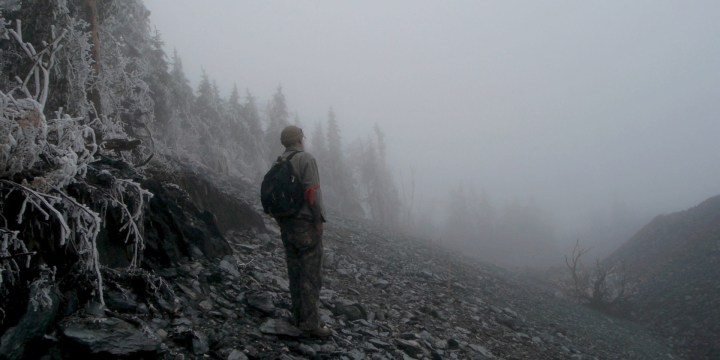
Filmmaker Michael Moore’s new documentary has just enough of his playbook agitprop to look like a credible new voice in climate journalism. But Planet of the Humans is more like a kindergartener using wax crayons to explain the climate crisis to a campus of PhDs. This is the celluloid equivalent of the Dunning-Kruger effect — he doesn’t know enough to realise how little he knows.
Whatever you do, please don’t waste a moment of your Covid-captured time on the movie that this review is about.

A still from the film, ‘Planet of the Humans’. (Production stills supplied)
The chances are, though, you have already been lured into watching Planet of the Humans, given documentary filmmaker Michael Moore’s heavyweight bona-fides (Bowling for Columbine; Fahrenheit 9/11), his penchant for exposing the truth with ambush-style interviews, and the fact that he is streaming his latest movie free online for a month as a gift to us during the coronavirus lockdown. Why not capitalise on a captive audience, and at the same time lob a hand grenade into the middle of the environmental movement in the same week we celebrate the 50th anniversary of Earth Day this April?
Spoiler alert. For those of you who may not have clicked the play button, this film doesn’t teach us anything new about the climate crisis, and in many cases misleads with outdated, or error-ridden, claims. The accusations it makes against the kingpins of the “failed” environmental movement are troublingly short on evidence. And while it gets one thing right — that predatory capitalism is indeed the machine driving ecological overshoot and climate collapse — the film reduces the solution to a matter of population control and individual consumption patterns. It overlooks the fact that we live in a grossly unequal world where a few centuries of developed-world expansion is coming at the cost of basic survival of those in the developing world.
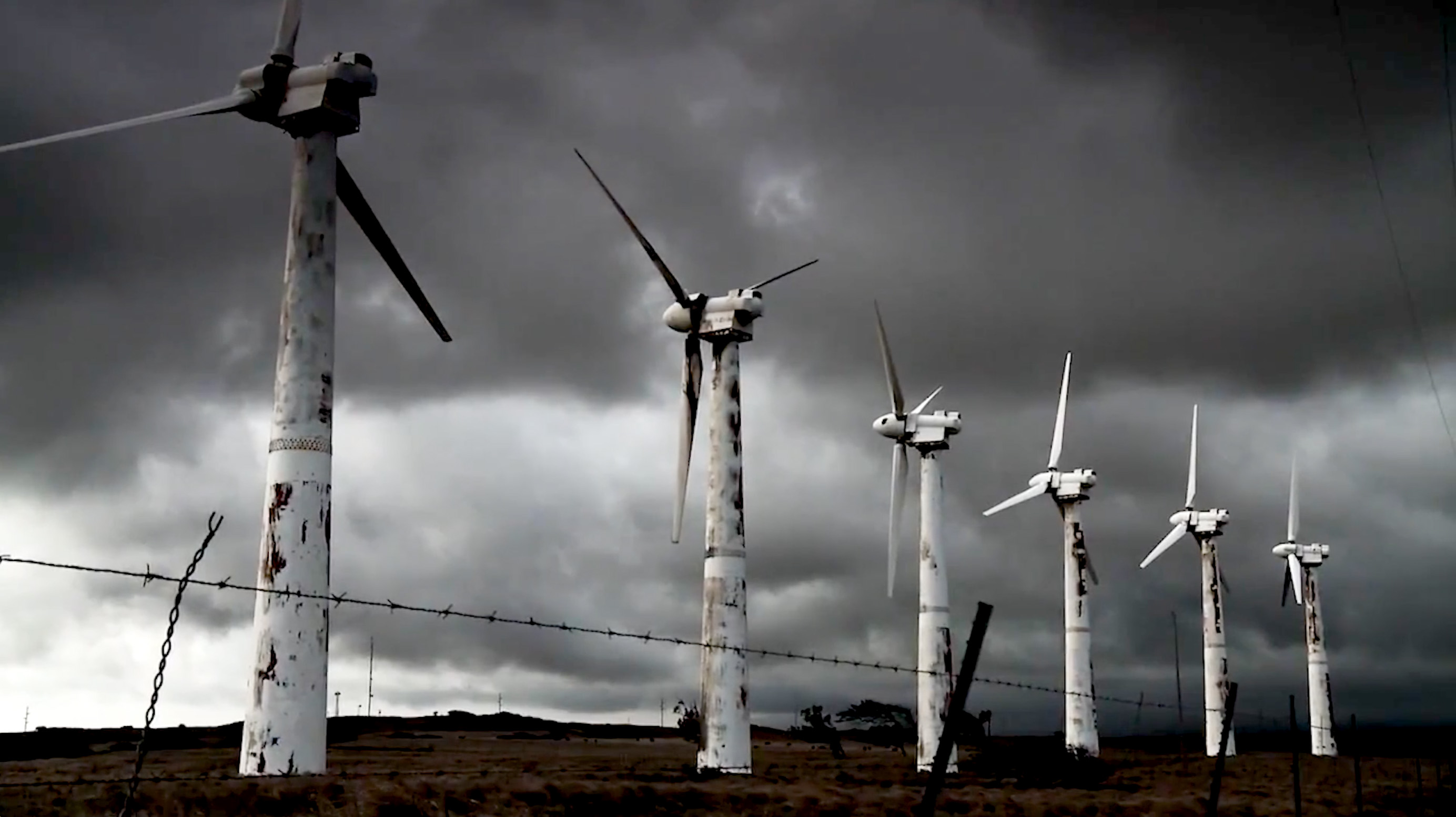
Abandoned wind power turbines, a still from ‘Planet of the Humans’. (Production stills supplied)
In his grossly US-centric myopia, Moore and his filmmaking team implicitly lump your average African or South American living on less than two dollars a day into the same camp as an amorphous greedy (Global North?) bunch they’re pointing the finger at. We won’t slow climate collapse, they say, until we all stop having babies, and stop consuming so much.
This tired, old population-is-driving-climate-collapse debate has been flogged to death.
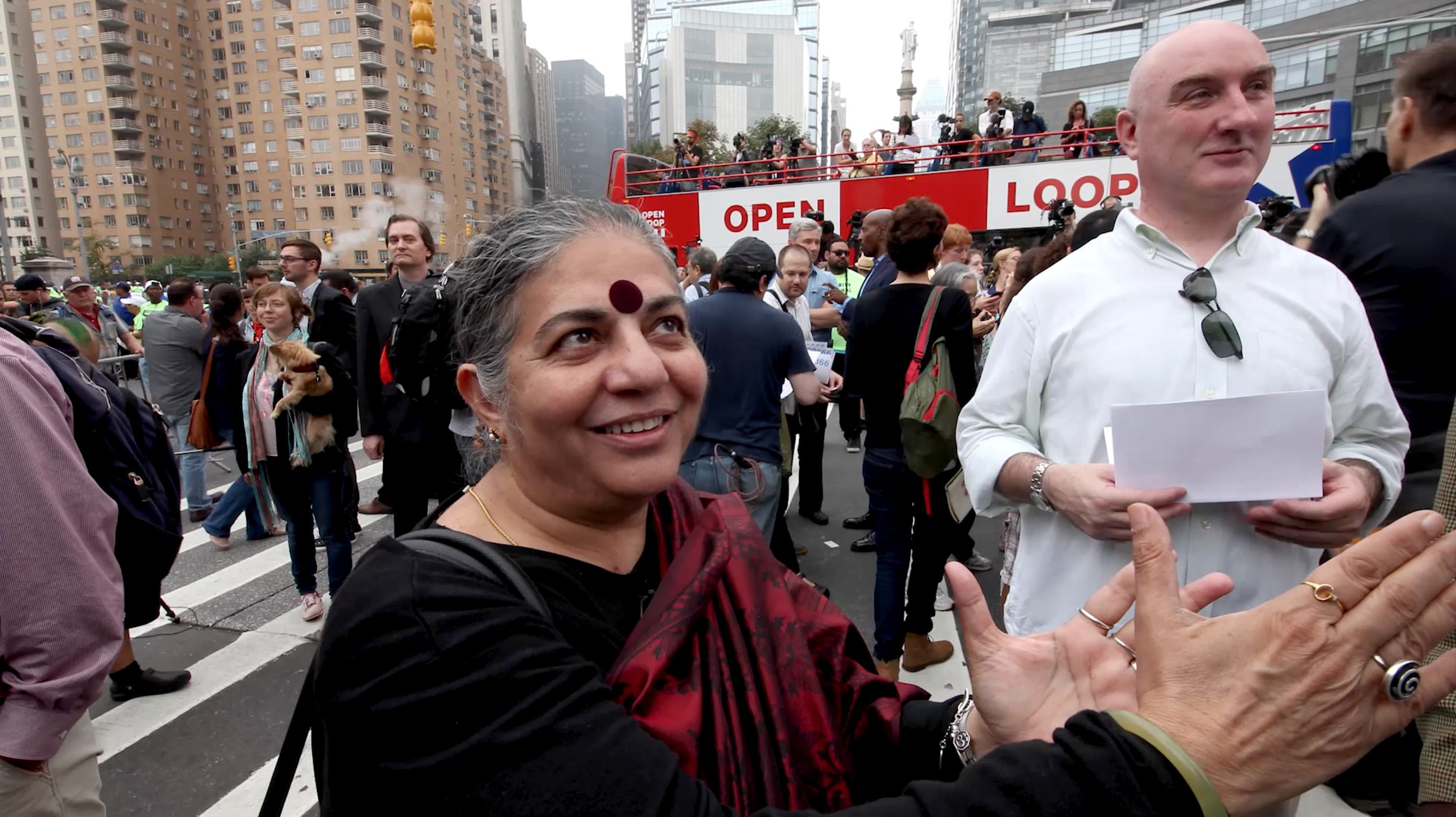
Vandana Shiva, a still from ‘Planet of the Humans’. (Production stills supplied)
As for the inequity of the global economic system and the consumption patterns that are pushing us beyond our hard planetary boundaries, the coronavirus crisis is showing exactly where the film’s analysis fails. Your average person living in an informal settlement in South Africa hasn’t got much to consume on the best of days. Many in our country can barely eat right now, as the economy shuts down while we contain the spread of the virus, let alone stop the voracious consumption that in Moore’s shallow view is common across a homogenous world.
Yet the movie is pushed with such Moore-esque self-confidence that it might actually get the kind of traction that his previous blockbusters have. If it does, it will set the climate discourse back years, the years we don’t have time for.
The plucky heroes and the plot-line curveball
Moore is the executive producer for this flick. His long-time wingman Jeff Gibbs, a self-confessed environmentalist, activist, and storyteller, gets in front of the camera this time. The duo then launches into what they believe is an urgent exposé of the corruption within the failed climate movement.
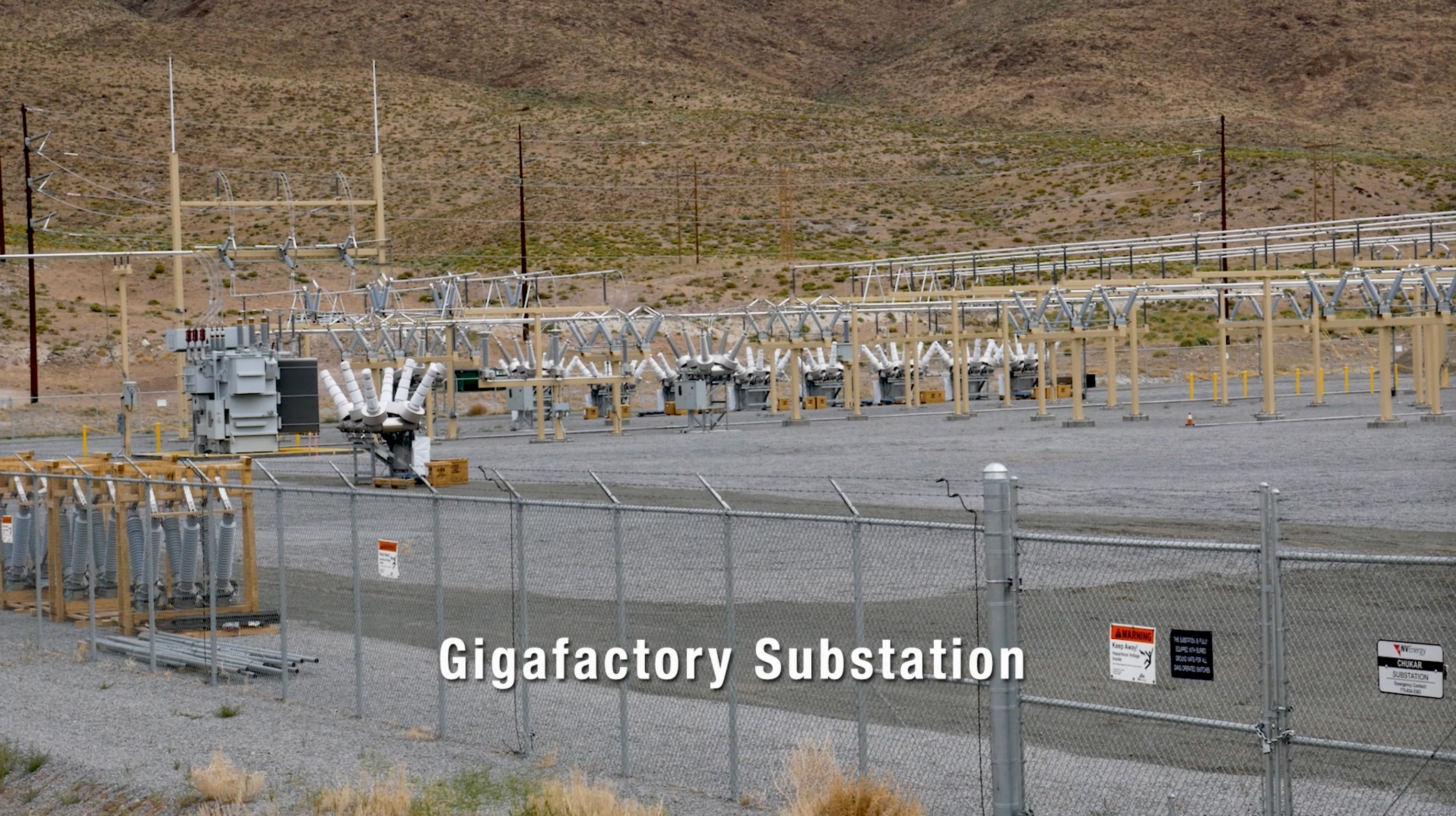
Tesla Gigafactory Substation, a still from ‘Planet of the Humans’. (Production stills supplied)
Our brave investigators explode the “myth” that renewable energy (RE) is the saviour of the climate crisis. They show how solar and wind energy are the ugly offspring of the same profit-driven interests that got us into this mess with fossil fuels in the first place. The industrial-scale resource extraction needed to build a global green grid is as devastating for the environment as is the extraction for a fossil fuel grid. Gouging out the Earth’s skin to mine coal is no different to doing so to get lithium to make a Tesla battery. Besides, they say, RE is inefficient and won’t solve our planetary energy needs: how do you power a green grid when the sun doesn’t shine, or the wind doesn’t blow? Electric vehicles are a sham, because all those car batteries are juiced up on a carbon-polluting coal-fired electricity grid.
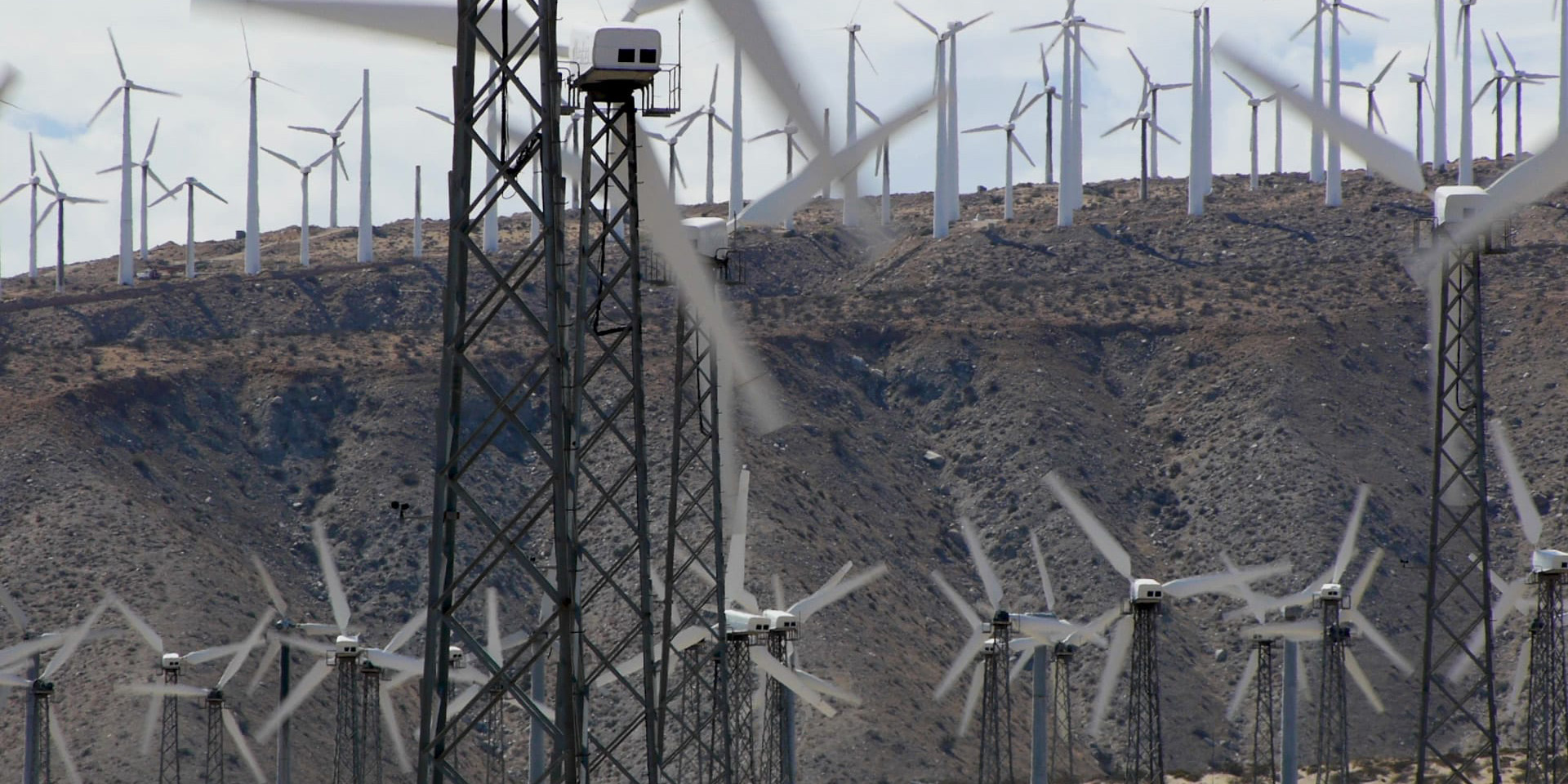
A wind farm from the film, ‘Planet of the Humans’. (Production stills supplied)
Well, yes and no. Each of these is a complex and technical question but if the filmmakers had done their homework, they’d have found that most of these have been answered already, like the issue of transitioning an electric vehicle fleet on to green energy or providing base-load electricity on a decentralised RE grid.
The technical reviews of the film are coming in thick and fast, showing just how out of date their data is, and how factually wrong they are in many of their claims. So wrong, in fact, that the film streaming service Films For Action took the film down within days of its release, after they found it to be “full of misinformation”. The platform has since doubled back on its decision and put it back up, with this explanation.
Toppling the ‘bad guys’ in the climate movement
Heads roll in this movie. By Moore and Gibbs’s measure, not only are the predatory fossil fuel capitalists continuing to plunder Earth’s resources by moving into the new age of energy, but the kingpins of the environmental movement have been captured by these interests and are the green-washing frontmen in a massive deception. Green movements like 350.org and its founder Bill McKibben, Al Gore, the Sierra Club, The Nature Conservancy and others come into the crosshairs.
It’ll take too long to pick apart each of the charges the filmmakers bring against the individuals or organisations, but taking a look at one example gives some idea of how Moore and Gibbs treated their investigation.
The climate movement 350.org and its founder Bill McKibben come under attack for promoting wood-burning to fire the new-generation green grid.
The filmmakers splice together footage of McKibben enthusiastically promoting tree burning for energy at the opening of a college biomass plant. Later, they catch him and others off guard at a climate rally, using Moore’s playbook ambush-type interviews, and it doesn’t look good. None of them seem to have their facts straight on how unsustainable biomass burning or harvesting forests are for electricity generation.
What the filmmakers don’t show, though, is that the original footage dug out from the archives of McKibben speaking at the podium dates back to 2009. In the decade since then, both he and the organisation have changed their position decisively on biomass burning, something which a simple question to the organisation or even a Google search would have unearthed. (This 2016 article is a starting point, but there are several more out there).
A second charge is against 350.org’s divestment campaign. The divestment movement aims to move global capital out of fossil fuel investments and into renewables. The film tries to blow the campaigners out of the water by exposing the fact that while 350.org calls for divestment from fossil fuels, it supposedly endorses funding initiatives that are still almost fully invested in fossil fuels.
Evidence exhibit one: a green funding scheme called the Green Century Funds. According to the film, 350.org endorses this equity investment fund, but the filmmakers’ investigation shows that this fund invests less than 1% in solar and wind energy, and 99% in fossil fuel companies, along with other big corporates whose businesses drive deforestation and plastics pollution.
Slam-dunk, right?
Only, 350.org doesn’t endorse the Green Century Funds, or any others like it, according to McKibben and the organisation’s media head, Alex Rafalowicz.
The Green Century Funds report used in the doccie to make this claim is in fact a technical guide to divestment which 350.org helped draw up in 2013 as a tool to show the finance world how to navigate the divestment process, which back then was still a relatively new idea. According to Rafalowicz, who spoke with the Daily Maverick shortly after the film’s release last week, this guide included a list of investment options available at the time, and that it was a screening tool to help move money away from carbon polluting businesses.
“We were not endorsing any of the funds or shares listed [in the report],” says Rafalowicz.
This doesn’t mean we should take 350.org’s contestation at face value — every organisation, green or not, should get the same scrutiny in a thorough investigation. But journalism needs to get the facts right. If there’s any truth to the film’s claim that the campaigners in the divestment movement are speaking with a forked tongue, then that’s a documentary in its own right, not a five-minute Jerry Springer-style insert which either gets the facts wrong, or is outright misleading.
Journalism 101: right to reply
The filmmakers lob some heavy charges at McKibben and 350.org, but Moore and Gibbs didn’t approach the organisation to put questions to them on any of these issues, or ask them to answer these charges in a standard right-of-reply process.
The right-of-reply step in the journalistic process isn’t about giving the accused a chance to cover their tracks, it’s about getting the facts right in the interest of the public good.
McKibben says that the filmmakers did not contact 350.org at any stage in the making of the movie. When the organisation heard that the documentary was being made, 350.org made several attempts to reach the filmmakers, but got no reply.
(Here’s the organisation’s response to the film.)
If the filmmakers were this sloppy on just two of the claims they make, what does that say about the rest of the film’s arguments?
Johnny-Come-Lately duo already ‘scooped’
The film that Moore and Gibbs should have made is Planet of the Predatory Capitalists. The plunder of the planet and destruction of our life-supporting natural systems is not a simple question of the failings of the human condition. It’s the result of a half-century of neoliberal economics. The problem isn’t population growth on its own, or some homogenous greedy human behaviour.
But Moore and Gibbs have already been scooped on this story. There’s an archive full of books, documentaries, and clever thinking out there that makes this case. The fact that the filmmakers don’t seem to have found this library of thought suggests that they haven’t done their homework. They weigh into a discussion using arguments that are years out of date, but they don’t seem to know enough about the topic to realise that they’re a Johnny-Come-Lately duo on a campus of seasoned thinking.
But in less than a week of the film’s release, the eco-fascists and climate deniers are already adding it to their arsenal. As one critic puts it, this film is a “gift to Big Oil”.
In the face of a planetary emergency, the climate movement simply doesn’t have time to waste on answering the misleading claims made in Planet of the Humans or to expose the filmmakers’ ham-fisted or inept attempt at journalism. DM


















